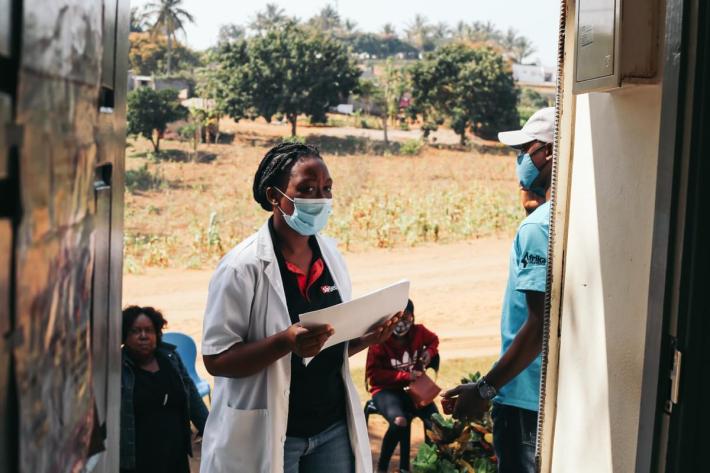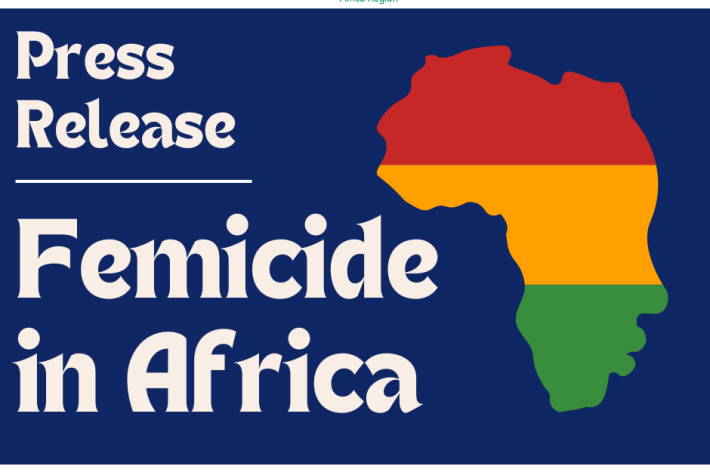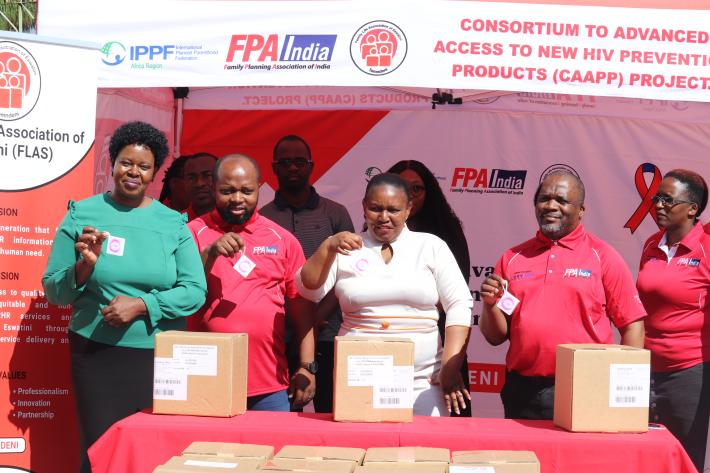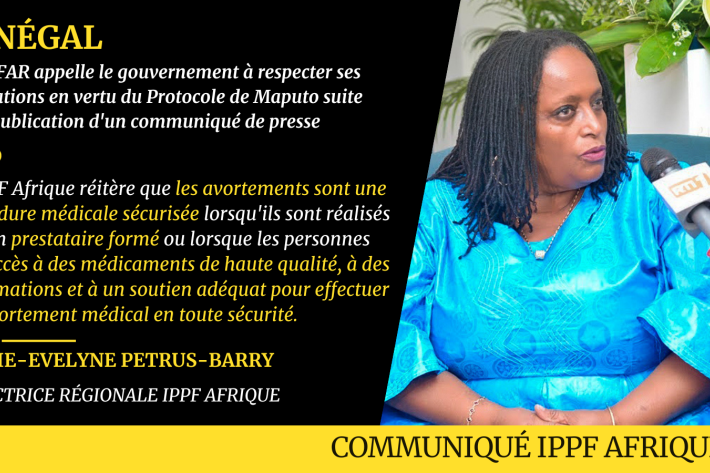Latest press releases
A selection of stories from across the Federation
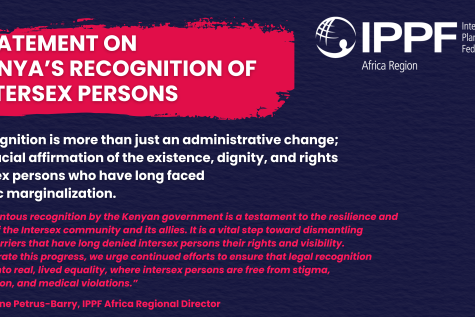
Kenya
IPPF Africa Region Welcomes Kenya’s Landmark Recognition of Intersex Persons
IPPF Africa Region Welcomes Kenya’s Landmark Recognition of Intersex Persons Nairobi, Kenya: 13 February 2025 – On 31 January 2025, Kenya has taken a groundbreaking step towards inclusivity and human rights by officially recognizing intersex as a sex marker alongside male and female in the Kenya Legal Notice 153 of 2025.


| 28 July 2022
IPPFAR Joins the World in Celebrating International Women’s Day 2021
8 March 2021. Today, IPPF Africa Region joins the rest of the world in celebrating the International Women’s Day (IWD). This is a day set aside to reflect, assess, honor and recognize the important role that women play in society. It is a day to celebrate the social, economic and political achievements of women across the world. This year, the IWD theme is ‘Women in Leadership’. Incidentally, this year’s IWD comes at a time when the world is celebrating the recent appointment of Dr. Ngozi Okonjo-Iweala as the World Trade Organization’s Director General. She becomes the first woman and the first African to ever hold this influential position. Dr. Okonjo-Iweala’s appointment is a significant step towards gender equality, more so where by 2030, the world is expected to have achieved gender equality as set out in the Sustainable Development Goals. In the African political scene, we celebrate the achievements of women who have held the powerful positions of Heads of State; Ellen Johnson-Sirleaf of Liberia, Joyce Banda of Malawi, and Catherine Samba-Panza of the Central African Republic. In African Parliaments, the efforts of countries like Rwanda, South Africa, Senegal and Namibia have affirmatively taken steps to increase the representation of women. Though this is not enough for the continent, it is still worth noting. This year’s IWD also comes at a time when the world is reeling from the effects of the unprecedented COVID-19 pandemic. Various players in both the public and private sectors have been involved in curbing the spread of the disease and mitigating its' effects. In different capacities, women have led their countries’ national responses to COVID-19. Most notably are the 12 women Ministers of Health from the countries of Uganda, Ethiopia, Eritrea, Tanzania, Somalia, Republic of Congo, Egypt, Angola, Mozambique, Guinea Bissau, Liberia and Burkina Faso, whose leadership in these influential dockets is significant. At the grassroots level, women led and continue to lead hundreds of community initiatives in response to the COVID-19 pandemic. They are frontline workers, mobilizers services, community health volunteers and have been involved in the production of millions of sanitizers, masks and protective gear. Initiatives such as Wheels for Life, a free taxi service in Kenya championed by Dr. Jemimah Kariuki saved the lives of hundreds of pregnant women who needed delivery services during the curfew hours. At the IPPF Africa Region, we remain committed to advancing women’s leadership across all levels. 41% of our Member Associations (MAs) have women as Executive Directors, while 47% of the Youth Action Movement (YAM) - IPPF Africa Region volunteer youth governance arm, have young women as their Presidents. We have put in place organizational structures, policies and practices that have ensured that women’s growth and success in leadership is not curtailed and we are determined to continue and do better. While Africa has achieved notable progress in women in leadership positions, we still have a long way to go. There is still a lot more to do to ensure women are treated as equals in positions of power. IPPFAR reiterates its commitment to the achievement of gender equality in the continent.

| 28 July 2022
IPPFAR Joins the World in Marking the International Human Rights Day
10 December 2020. IPPF Africa Region joins the world in marking the International Human Rights Day. This year, the theme of the international human rights day is: “Recover Better – Stand up for Human Rights”. During these dire times of the pandemic, human rights violations have continued everywhere in the world. In Africa, numerous incidents of use of excessive force, arbitrary arrests or detention, restrictions on civic space, and blanket denial of the right to seek asylum during the implementation of COVID-19 prevention measures have been reported. For example, in Kenya, the manner of enforcement of emergency measures by police amplified negative human rights impacts, and led to deaths, injuries, sexual and gender-based violence and hundreds of arrests. In South Africa, the army and the police were accused of shooting, beating, teargassing and water bombing people suspected of violating lockdown measures. The same was witnessed in Ivory Coast where police clashed with citizens who were protesting against the establishment of a coronavirus testing center in the capital city of Abidjan. While public health protocols and control measures are indeed necessary, they should not come at the expense of people’s human rights. According to UN Women, prior to the pandemic, violence against women across the world was already alarmingly high, with nearly one in five women (18%) experience violence in the past 12 months at the hands of an intimate male partner. With COVID-19, an increased reporting of domestic violence has surfaced, with a staggering 40% rise in some countries. The pandemic has forced victims to stay at home with their abusers, leaving them with few opportunities to seek shelter or solace. Access to vital sexual and reproductive health services, including for women subjected to violence, have become more limited. Other services, such as hotlines, crisis centers, shelters, legal aid, and protection services have been scaled back, further reducing access to the few sources of help that women in abusive situations might have. Victims in the world’s poorest countries, especially those with already-existing humanitarian crises, are the most vulnerable. As the UN High Commissioner for Human Rights recently stated : «COVID 19 is a test of societies, of governments, of communities and of individuals. Now is the time for solidarity and cooperation to tackle the virus, and to mitigate the effects, often unintended, of measures designed to halt the spread of the virus. Respect for human rights across the spectrum, including economic, social, cultural, and civil and political rights, will be fundamental to the success of the public health response and recovery from the pandemic.». The norms and principles of human rights should guide governments’ responses to COVID-19, with these rights strengthening the public health response to the pandemic. People’s fundamental human rights, such as the right to life and duty to protect life and the right to health and access to healthcare, that are enshrined in Constitutions and embedded in various international instruments must be respected, regardless of the prevailing circumstances. IPPF Africa Region takes this opportunity to call upon all relevant authorities to ensure that everyone’s human rights are respected, protected and fulfilled in the response to the pandemic.

| 28 July 2022
IPPFAR Statement on World AIDS Day 2020
1 December 2020. Today, IPPF Africa Region joins the rest of the world in commemorating the World AIDS Day. This is a day set aside for individuals, governments, organizations, activists and other stakeholders to recognize the challenges of the HIV/AIDS epidemic, evaluate responses and renew their commitments towards eliminating HIV/AIDS. HIV continues to be a major global health issue, with the World Health Organization estimating that there were about 38 million people living with HIV at the end of 2019. Africa is hardest hit, with an estimated 68% of people living with HIV living in sub-Saharan Africa. This year’s commemoration is unique as it comes at a time when the world is reeling from the effects of the COVID-19 pandemic. The pandemic continues to pose significant threats to the gains achieved over the years in the war against HIV/AIDS across the world. Seizing the Moment, a new report released by UNAIDS on the global AIDS epidemic indicates that 2020 targets will not be realized because of the challenges that have been caused by the COVID-19 pandemic. The report further suggests the possibility of the global AIDS response being set back by 10 years or more if the COVID-19 pandemic results in severe disruptions to HIV services. This, with the background of a global community that is determined to end AIDS as a public health threat by 2030. COVID-19 has significantly affected people’s access to HIV counseling, testing, treatment and management services. Women and girls are hardest hit by HIV/AIDS. According to UNAIDS, women and girls in sub-Saharan Africa accounted for 59% of all new HIV infections in the region in 2019, with 4,500 adolescent girls and young women between 15 and 24 years old becoming infected with HIV every week. Young women accounted for 24% of new HIV infections in 2019, despite making up only 10% of the population in sub-Saharan Africa. These figures are unacceptably high. IPPFAR takes this opportunity to call on all stakeholders to re-think effective strategies that will accelerate and sustain HIV/AIDS gains now, and beyond the COVID-19 pandemic. We must not relent in pushing African governments to strengthen their health systems and policies that will accelerate the achievement of HIV/AIDS goals. It is imperative that African governments implement their commitments to various instruments for the realization of health goals, such as the Abuja Declaration and the Maputo Plan of Action. Further, with shrinking donor funds, governments must strategize on domestic funding strategies that must be fully implemented. Governments, the private sector, in partnership with the research community and medical associations, must also invest in cutting-edge research on the prevention, treatment and global understanding of HIV/AIDS. Civil society and faith-based organizations should be encouraged to develop effective community models and put in place measures that eliminate any human rights barriers that prevent the achievement of these goals. IPPFAR reiterates its commitment to supporting all measures aimed at realizing an AIDS-free generation in Africa.

| 28 July 2022
IPPF announces the appointment of Marie-Evelyne Pétrus-Barry as Africa Regional Director
We are delighted to welcome Ms Marie-Evelyne Petrus-Barry as our new Regional Director. She joins the IPPF family from Amnesty International where she was the Regional Director for West and Central Africa based in Dakar, Senegal. Before working at Amnesty International, Marie-Evelyne had served as Senior Official in numerous UN agencies, including UNDP, UNFPA, UN Department of Public Information, UN High Commission for Human Rights and UN mission in Haiti. Marie-Evelyne has been a human rights defender since she was a teenager. She has promoted equity for all, the elimination of racial discrimination and the eradication of injustice. Her advocacy efforts towards tolerance and inclusivity have enhanced the development of peaceful and sustainable communities across Africa across the world. IPPF Africa Region will greatly benefit from her experience in human rights, development, strategic communications including mediation and peacebuilding to reposition its work in the Africa region and beyond. Marie-Evelyne’s robust wealth of experience in diplomacy, working with governments, advocacy and impacting policy, will enhance IPPF’s mandate and work particularly in the improvement of the living conditions of women and youth throughout Africa. “I hope to lead IPPF Africa to ensure access to life-saving reproductive health and rights services to all girls, women and youth on the African continent, thus contributing to the realization of all their human rights and enhancing a new Africa, free of discrimination and working for the development of all its citizens, “ said Marie-Evelyne Petrus-Barry. IPPFAR is, therefore, approaching 2020 with new hope. Ms Evelyne will be leading her team towards a new era of sexual and reproductive health and rights (SRHR) advocacy and service delivery. Her work will be supported by the governance reform that has just been agreed upon at IPPF general assembly in Delhi.
| 28 July 2022
IPPF statement on Western Hemisphere Region
5 August 2020 - IPPF regrets the decision of the Western Hemisphere Region, taken by its Board, to withdraw from the Federation, and is deeply sorry to see a number of Member Associations from the region resign from IPPF. As the largest global Federation working on sexual and reproductive health and rights, in more than 160 countries, IPPF is committed to continuing to work in all parts of the Americas to provide healthcare and fight for sexual and reproductive freedom for women, girls, men, boys and all people of all gender identities. This is more urgent than ever during a health pandemic and with continued opposition to sexual care and rights from repressive conservative forces in the Americas and around the world. IPPF is completely open to all our current Western Hemisphere Region members remaining part of the global Federation while they also form a new regional relationship and pledges its continuous support to those in the region that have committed to remaining part of the Federation. Membership is voluntary and it is entirely up to individual members to decide on their own course. As a locally owned, globally connected movement however, IPPF has always believed that we are stronger together. Over the last fifteen months, IPPF has been on a journey of reform. It has changed by choice, for choice. It has worked in partnership with members, donors and its regulator to develop best practice safeguarding policies and processes. It has dealt with and continues to deal with any cases of unacceptable behaviour. A safeguarding system is in place across the entire Federation to allow clients, staff, volunteers and any individual to report concerns confidentially. In November last year reforms to IPPF’s governance and funding model were agreed unanimously at a General Assembly of member delegates drawn from every region, including Western Hemisphere. Unfortunately, the Board of Western Hemisphere Region felt it could no longer support this new model. Discussions between the region’s Board and IPPF’s Board on a way forward had been ongoing. We are sorry these will not now continue. IPPF has been a locally owned, globally connected Federation for 68 years, supporting all its members and the millions of women, girls and vulnerable clients they serve. That will not change, and we remain committed to working with members and partners across the globe.

| 28 July 2022
Sub-Saharan Africa: Government Responses to COVID-19 Should Guarantee the Protection of Women and Girls’ Rights
07 May 2020- Authorities in Sub-Saharan Africa must ensure their responses to the COVID-19 pandemic include specific protections for the rights of women and girls, International Planned Parenthood Federation Africa Region (IPPFAR), Amnesty International and Women's Link Worldwide said in a report published today. The document provides a roadmap for governments and regional organisations for taking the necessary measures to protect the rights of women and girls, who are often disproportionately affected in crisis situations. It highlights states’ obligations to guarantee the right to live free from discrimination and violence and calls on governments to ensure access to essential sexual and reproductive health services, commodities and information during the pandemic. “The current COVID-19 pandemic has exacerbated the vulnerability of women and girls. Their health and wellbeing is not only negatively impacted by the disruption of essential sexual and reproductive health services such as contraceptives counselling, maternal and newborn health, gender-based violence (GBV), and testing and treatment for HIV and sexually transmitted infections; but also their livelihoods and even their lives are threatened when sexually based crimes go invisible and stay unpunished,” said Marie-Evelyne Petrus-Barry, IPPF Africa Regional Director. “This is why the African Union, regional economic commissions, governments and women rights defenders must redouble their efforts in ensuring that the sexual and reproductive health and rights of women and girls are protected and upheld and violations of these rights are documented and dealt with by justice systems.” The organisations are calling for governments to take urgent action to protect the rights of women and girls, highlighting the specific gender risks which the COVID-19 pandemic poses. Example highlighted in the report includes the right to live free of violence and any form of torture, inhumane or degrading treatment. “During times of crisis and turmoil such as the one we are living in, women and girls face an increased risk of suffering violations of their rights. This is especially true for women already living in marginalized situations. For this reason, it is urgent that we work to ensure that their rights are respected and guaranteed,” said Viviana Waisman, President & CEO of Women’s Link Worldwide. “These guidelines are a roadmap to allow us to carry out this monitoring and advocacy work and demand that governments comply with their obligations and maintain their commitment to the rights and lives of women and girls during the COVID-19 pandemic.” According to the report, the implementation of measures such as curfews, lockdowns or travel restrictions may lead to police brutality and violence which ultimately poses a risk for women and girls to being subjected to sexual violence. There are also concerns of increase in teenage pregnancies, as previously observed in Sierra Leone following the lockdown imposed to halt the spread of the Ebola epidemic. Governments should put safeguards in place to ensure women and girls are protected from sexual violence and have access to sexual and reproductive health services and commodities. The organisations also call for better protections for refugee and migrant women. Africa hosts more than 25.2 million refugees and internally displaced people and houses four of the world’s six largest refugee camps in Uganda, Kenya, Tanzania and Ethiopia. Refugee camps in the region usually provide inadequate and overcrowded living arrangements that present a severe health risk to inhabitants. “As COVID-19 spreads across the region women and girls have reportedly already faced an increase in domestic violence. Restrictions on movement, social isolation and lockdowns can make it even harder for women to access essential services like sexual and reproductive healthcare and protection from domestic violence,” said Samira Daoud, Amnesty International West and Central Africa regional director. “We call on governments in the region to act urgently to prevent gender gaps increasing. Any measures taken to respond to the COVID-19 pandemic must respect and protect women’s rights, including the right to live free of violence and torture and other ill-treatment, and the right to access justice.” *Spokespeople available for interviews Read press release in French here. ABOUT OUR ORGANISATIONS IPPFAR: The International Planned Parenthood Federation Africa Region (IPPFAR) as the leading sexual and reproductive health (SRH) service delivery organization in Africa, and the leading sexual and reproductive health and rights advocacy voice in the region. Amnesty International: Amnesty International is a global movement of more than 7 million people who take injustice personally. We are campaigning for a world where human rights are enjoyed by all. Women’s Link Worldwide: Women’s Link Worldwide is an international nonprofit organization that uses the power of the law to promote social change that advances the human rights of women and girls, especially those facing multiple inequalities.
Pagination
- First page
- Previous page
- …
- 8
- 9
- 10
- …
- Next page
- Last page











